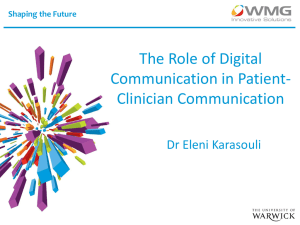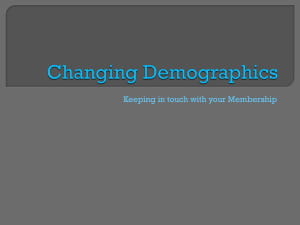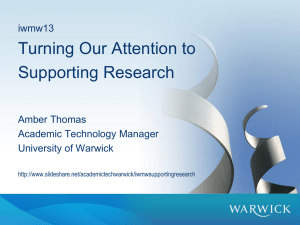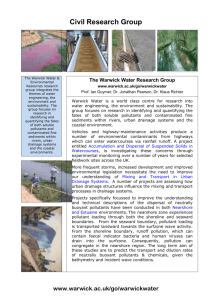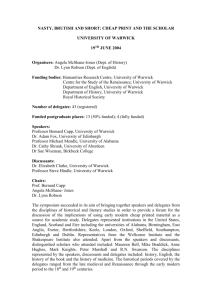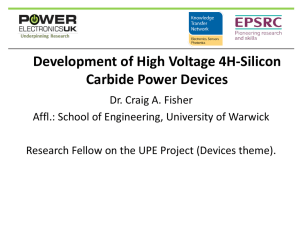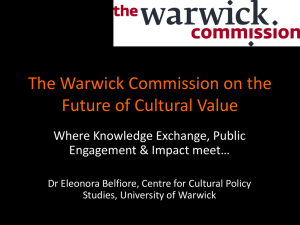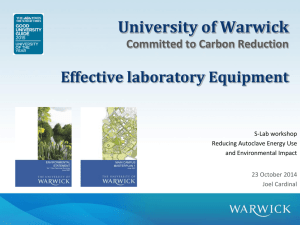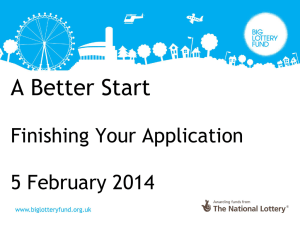the Warwick Women in Science Symposium 2011
advertisement
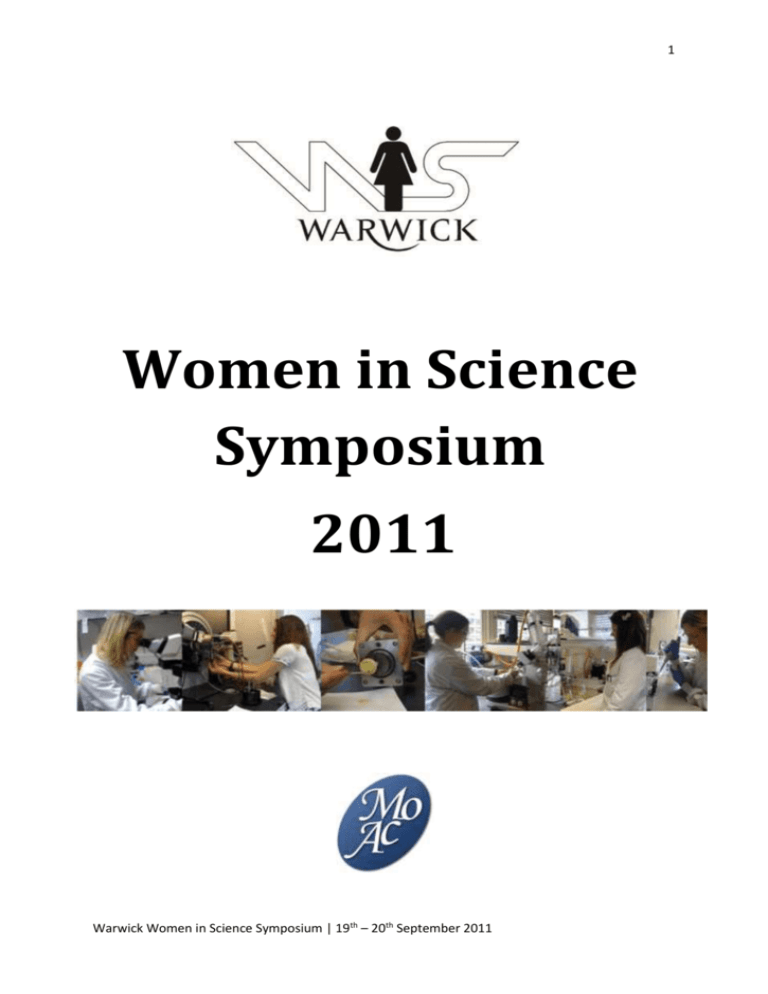
1 Women in Science Symposium 2011 Warwick Women in Science Symposium | 19th – 20th September 2011 2 Contents Welcome 3 Timetable: Monday 4 Tuesday 5 Keynote Address Biography 6 Participant Biographies 7 Warwick Careers Service 10 Important information 12 Acknowledgements 14 Useful Websites 15 Survey 16 Warwick Women in Science Symposium | 19th – 20th September 2011 3 Welcome to the Warwick Women in Science Symposium 2011 Thank you for joining us by participating in this Warwick Women in Science Event. We are very much looking forward to the next two days and hope you will find them inspirational, stimulating, useful and fun. We are extremely lucky to have participants from various walks of life who can share their amazing stories and insights with us. Mission Statement The event will seek to inspire, educate and establish a supportive network for female PhD students and early-career researchers in the sciences at Warwick. Many of us have a passion for science and the desire to pursue a career in the scientific world, however as women, we face some unique obstacles and challenges. All of us may have asked ourselves similar questions during our academic careers: Can we succeed in Academia?... Can we become successful leaders?... What steps can we take, now, in our early careers, towards this goal?... Can we leave Academia and succeed in Industry?... Are the challenges different?... How much does having a family have to interfere with our career?... Do we have to make a choice?... Why aren't there more women in prominent positions in scientific fields?... Should there be more women in prominent positions in scientific fields?... What can women offer to science that is unique? We hope that by the end of the event that we all will have gone some way toward answering these questions for ourselves. WIS Warwick Women in Science began as an after dinner discussion between four people, in the middle of rural Wales. In the company of three budding female scientists the natural discussion revolved around why women leave science and how the fourth member of the conversation (Ann Canham) became successful, while maintaining her enthusiasm, personal life and sanity. We considered the unique challenges faced by women and how those challenges have been overcome by several inspiring women of our acquaintance. We formulated the idea of WIS and holding a Symposium where like-minded women could come together. We hope to enable women who would like to be successful to interact with and learn from women who are successful in the many diverse facets of science. We were lucky to find kindred spirits in Alison Rodger and Ann Canham, without whose support the event would have been impossible. In 2010 we discovered that our vision was also shared by many of our peers. Due to the success of our inaugural symposium we have decided to make WIS a recurring event, to reach as many Warwick Women as possible. We all believe that becoming a success requires one to be proactive and is truly about meeting our own potentials, whatever we as individuals consider those to be. With many thanks, Lauren Hepple, Natalie James, Kate Jordan & Helen Playford Warwick Women in Science Symposium | 19th – 20th September 2011 4 Monday 19th September 10.30 Registration and Coffee 10.50 Welcome Lauren Hepple, Helen Playford, Kate Jordan, Natalie James – Chairs 11.00 Keynote Address ‘Maintaining the momentum: opening up the full range of science careers for women’ Diana Garnham – Chief Executive of Science Council 12.00 Lunch 13.00 Maximising your Leadership Potential Dr Ann Canham 14.00 Coffee 14.15 Decision-Making Skills and CV Writing Professor Alison Rodger 15.45 Coffee 16.00 Vignettes: Stories of Success Professor Pam Thomas Professor, Department of Physics, Warwick University Dr Rachel O’Reilly Associate Professor, Department of Chemistry, Warwick University Professor Laura Green Professor, School of Life Sciences, Warwick University Dr Irene Hames Editorial Consultant, Irene Hames Consulting 18.30 Dinner Warwick Women in Science Symposium | 19th – 20th September 2011 5 Tuesday 20th September 9.30 Breakfast 10.00 Breakout Sessions 10:00 11:00 12:00 Breakout Session 1 Breakout Session 2 Breakout Session 3 Please note, each breakout session will be offered 3 times. Available breakout sessions include: CV Clinic – Gill de Calvo (PhD’s) 10:00 – 10:50 CV Group Workshop 11:00 – 13:00 Individual 15 minute slots CV Clinic - Julie Gallimore (PDRA) 11:00 – 12:15 Individual 15 minute slots Careers in Academia – Dr Rachel O’Reilly and Professor Laura Green Careers in Science Publishing – Dr Irene Hames Leadership Potential – Dr Ann Canham 13.00 Lunch At 13.30 a panel of our speakers will be available to answer your questions. Close Paperwork signing session for those using WIS for Leadership and Decision Making Module of Postgraduate Certificate in Transferable Skills in Science Warwick Women in Science Symposium | 19th – 20th September 2011 6 Keynote Address Biography: Diana Garnham Diana Garnham is Chief Executive of the Science Council, an umbrella organisation for learned societies and professional bodies in science which works to promote science and its applications for public benefit. The Science Council also awards the designations of Chartered Scientist (CSci) and Chartered Science Teacher (CSciTeach) and maintains common professional standards in scientific practice. A key project is Careers from Science aimed to improve science careers information for 11-19 year olds and show how well science and maths can equip people for a very wide range of careers (see http://www.futuremorph.org and the recently launched the http://www.hiddensciencemap.org. After studying politics and war studies, Diana did research in international politics at the University of Wales, Aberystwyth. She has led a number of representative umbrella organisations and coalition campaigns in science with a strong focus on developing collaboration and consensus. Diana Garnham is chair of the BIS Science for Careers Expert Group, has recently retired after serving eight years on the Council of the University of Nottingham and is a trustee of Sense about Science and several other charities. The Science for Careers Expert Group has recently published a series of reports arising from its Action Plan. Warwick Women in Science Symposium | 19th – 20th September 2011 7 Participant Biographies Dr Ann Canham Ann retired from BP, where she was Vice President HR, at the end of 2005. During her career at BP Ann held several sales and marketing roles before moving to HR where her roles included a mix of Global Generalist HR and OD. Leading diverse global teams and working with diverse groups across the world provided enormous motivation and stimulation and opportunities. Continuing to work with such groups and individuals remains a major source of enjoyment and fulfilment. Ann has a first degree and Ph.D. in Psychology. Since Leaving BP, Ann is now pursuing a varied work lifestyle doing only the things that she enjoys and feels passionate about with the overall aim of providing stimulation, challenge and fun. Her work portfolio now includes coaching senior executives, facilitation for senior executive leadership programmes and dialogues, women’s leadership development, transferable skills training for PhD students and transition coaching for graduates. She is also called upon to act as a member of assessment panels for appointment of senior University positions. In the Charity sector Ann is trustee of a leading independent school and Chair of a charity that supports families affected by Drug and Alcohol abuse. She is also a member of a Lord Chancellor’s sub-committee assessing suitability of candidates for the magistracy. Ann lives in Buckinghamshire with her husband Richard. She has two daughters who remain a source of challenge, learning and enormous enjoyment and fulfilment. Professor Laura Green I graduated from the University of Bristol with a BVSc (hons) and spent one year in practice before being awarded a Wellcome Trust Scholarship which provided three years funding for a taught course MSc followed by a two year PhD. We had our first child in 1992 whilst I was completing my PhD and I was appointed to a lectureship one year later. I was a lecturer at Bristol from 1993 – 1999 with quite a high teaching load. During this time I established a research group and had two more children. With a desire to improve my research I moved to Warwick in 1999 and was appointed to senior lecturer in 2000, reader in 2004 and chair in 2005. Over this time I widened my research portfolio and collaborated widely and was successful in competing for grants and writing papers. Since 2006 I have had strategic advisory roles to DEFRA, RELU, BBSRC and FAWC and am currently chair of Committee A for BBSRC that decides which of 450 grants per annum should be funded, funding of ~ 40 million pounds is available. I am also a member of FAWC (Farm Animal Welfare Council) who advise government Warwick Women in Science Symposium | 19th – 20th September 2011 8 on issues relating to farm animal welfare in GB. I have acted as director of postgraduate studies for biological sciences since 2007. I owe my success to hard work and determination and being strategic but could not have achieved my goals without support from my husband and family throughout and my PhD supervisor and several colleagues who have never doubted my ability to have a career and a family. I am passionate about ensuring that women (and men) understand how to be successful in their careers. Dr Irene Hames Irene Hames has a PhD in cell biology but has worked in scientific publishing for over 30 years. Following a decade as a freelance copy editor, book editor, project manager and trainer, she spent 20 years as the managing editor of a large, international science journal. She now works as an independent editorial consultant. She is frequently called upon to give talks and advise on editorial issues and has been a member of a number of working parties on peer review. She is the author of the book Peer Review and Manuscript Management in Scientific Journals: guidelines for good practice, published by Wiley-Blackwell in association with ALPSP (the Association of Learned and Professional Society Publishers). Irene is a Council Member and Trustee of COPE (Committee on Publication Ethics) and also holds advisory roles with Sense About Science (on the Advisory Council) and the International Society of Managing and Technical Editors (on the Industry Advisory Board). She is also a Specialist Adviser to the House of Commons Science and Technology Select Committee. Dr Rachel O’Reilly Dr O’Reilly is currently an EPSRC fellow in at the University of Warwick. She graduated from the University of Cambridge (1999) and completed her PhD at Imperial College in 2003. She then moved to the US to work at IBM Almaden and Washington University in Saint Louis, under the joint direction of Professors Craig Hawker and Karen Wooley. In 2004 she was awarded a Royal Commission 1851 fellowship and in 2005 she moved to the University of Cambridge with a Royal Society Dorothy Hodgkin Fellowship. In 2008 she was awards the RSC Meldola award and in 2009 the Macro group young researchers medal. She moved to Warwick in 2009 and is currently an associate professor in the chemistry department. Professor Pam Thomas Professor Pam Thomas has been a member of staff in the Department of Physics at the University of Warwick since 1990 and a full professor since 2005. She was educated at Oxford University, where she took an BA (Hons) in Physics and a DPhil on the subject of Optical Activity in Crystals in the Physical Crystallography Group of the Clarendon Laboratory. Following a period as a Research Fellow at the Clarendon Laboratory, she Warwick Women in Science Symposium | 19th – 20th September 2011 9 moved to Warwick in 1990 to found and head the Ferroelectrics and Crystallography Group, which is part of the larger Condensed Matter Physics activity in the Department. Pam is also responsible for the strategy and running of the inter-departmental X-ray Diffraction Facility within Physics. This has benefitted enormously from investment under the project Advanced Materials 1: Creating and Characterising Next-Generation Materials, supported by Advantage West Midlands and the European Regional Development Fund under the Birmingham Science City initiative. She is a frequent user of central facilities including synchrotron radiation at ESRF (France) and Diamond (UK) and neutron diffraction at ILL (France) and ISIS (UK). Pam is a member of the Commission of Inorganic and Mineralogical Crystallography for the IUCr, vice-chair of the Condensed Matter Physics division of IUPAP and Conference Chair for XTOP2010, the international conference on High-resolution X-ray Diffraction and Imaging, which was held at the University of Warwick in September 2010. Since October 1st 2010, Pam has also been the Director of the Science City Research Alliance for the Universities of Birmingham and Warwick in addition to her role as a research professor at Warwick. As of 1st September 2011, Pam has taken up the role of Chair of the Faculty of Science. Professor Alison Rodger Alison was born in Scotland; then lived in England; New Zealand; Australia; and England where she has remained for a (long) while. Her BSc, PhD and DSc are from Sydney University, her MA from Oxford (well at least they recognised she had some qualifications from Australia). She was Beatrice Dale at Newnham College Cambridge for three years from 1985 together with being an Overseas Scholar of the Royal Comission for the Exhibition of 1851. She then spent six year in Oxford first at St Catherine's College funded by Unilever then at St. Hilda's College as a Violette and Samuel Glasstone Fellow. At that time she set up the first Couette flow linear dichroism faciltities in the UK and that has been increasingly the basis of her research. Alison moved to Warwick University in 1994 where she has remained since. Her focus has been on research into flow-orientable biomacromolecules as (perhaps fortuitously or intrinsically) these are the ones about which we have comparatively little structural information and her techniques give data not available from any other source and training young scientists to enable them to reach their potential. As well as being fascinated by biomacromolecular structure she is committed to training early stage scientists and to that end has devoted a great deal of time and energy to the MOAC Doctoral Training Centre; the Postgraduate Certificate in Transferable Skills in Science; and most recently working to achieve a bronze AthenaSWAN award for the University and Silver for chemistry. Although AthenaSWAN's headline goal is about retention of women in Science, Engineering and Technology, it is now widely recognised that if we create a working environment where women do well, then men do better too. Warwick Women in Science Symposium | 19th – 20th September 2011 10 Warwick Careers Service The Centre for Student Careers & Skills organises workshops on making applications; going for interviews and assessment centres. If you've applied for a job and would like a tailored mock interview you can book this though SDS Reception in University House. All Careers events are advertised on our website including presentations by organisations that are keen to recruit Chemists and Scientists. Vacancies are published on our Vacancies database each day so check this regularly for new opportunities. Destination information from previous Chemistry students is available to help you in career planning. See the Resources section of our website, under Graduate Destinations, to see the latest graduate destinations information. The data is collected as part of a national survey each year. Six months is very early in a career so these results are only a small insight into some of the destinations open to you after you graduate. Sample sizes are very small too. You can also get an idea of what to do in the future through doing work experience. Read the reports written by students who have done an internship or other type of work experience on myAdvantage Info Sheets. And don't forget to visit the Student Careers & Skills in the Learning Grid in University House, to pick up free guides and Careers publications, whether you have a definite focus for your ideas or not. There are also many reference books and audio visual materials, many of which are now available to watch on line under the Resources tab (see Careers Films). Careers Advisors for Science Faculty Chemistry, Life Sciences and Maths: Gill de Calvo Computer Science and Psychology: Siobhan Scanlon Engineering: Lisa Carr Physics: Asaf Federman Statistics: Andy Lloyd Warwick Women in Science Symposium | 19th – 20th September 2011 11 Careers Support for Research Staff Roberts’ funded support staff: Who does what? Julie Gallimore - j.a.gallimore@warwick.ac.uk, Ex 23498 (SCS) – 60% FTE to provide careers advice & support as well as providing training initiatives / workshops in the Researcher programme. Careers support focuses on all aspects of career decision making and we can help you explore your unique set of skills, values and motivation. We are experienced in supporting researchers as they make applications, create CV’s and prepare for interviews. Many researchers who are managing contract working chose to take up this support ahead of changes to their contract to help them manage their transition. Sandy Sparks - sandy.sparks@warwick.ac.uk, Ex 74121 (LDC) - 80% FTE to provide enhanced communication and providing information to the research staff through; the monthly e-newsletter, annual researcher learning & development programme, the research staff groups in faculties an departments and the LDC/ Researcher website. One to one coaching. Manages the Roberts‘ funding for individual researchers & departments. Trudy Hillier - t.j.hillier@warwick.ac.uk, Ex 24670 (LDC) - 30% FTE to develop training initiatives for research staff in relation to Leadership & Management Development and Personal Effectiveness. One to one coaching and tailored workshops Dr John Burden - j.p.burden@warwick.ac.uk, Ex 51243 (RSS) – to provide support & advice to research staff on writing successful fellowship bids and grant applications. Advice and guidance about developing an academic track record as part of securing fellowship and grant funding. Trevor Robinson - t.robinson@warwick.ac.uk (Education) – 1 day per week – Business Engagement support through the Business Engagement Pilot Project Warwick Women in Science Symposium | 19th – 20th September 2011 12 Important Information Lunch & Dinner: Please be advised lunch and dinner will be provided in the MOAC seminar room. If you have any special dietary requirements please let us know. Vegetarian options will be available for all meals. Coffee/Tea: Mugs will be provided for coffee and tea at all times, we ask that the delegates please help us keep the area tidy by putting their used mugs in the dishwasher. Symposium Location: The WIS Symposium will be held in the MOAC area of Coventry House on the Main Campus of Warwick University. Please find a detailed map below. MOAC is on the 2nd (top) floor of Coventry House (building 14); please turn left at the top of the stairs. Please do not ask at reception as they are associated with the NHS and not MOAC. The nearest parking to MOAC is Car Park 7 (see map). Accommodation for presenters: Accommodation for presenters from out of town (pre-arranged) will be provided at Scarman House (see map below, building 52). Warwick Women in Science Symposium | 19th – 20th September 2011 13 Warwick Women in Science Symposium | 19th – 20th September 2011 14 Acknowledgements The organisers of the Warwick Women in Science Symposium would like to extend their warmest gratitude to Professor Alison Rodger, Dr Dorothea Mangels, Sarah Shute and MOAC for all of their support, without which the Symposium would not have been possible. We would also like to thank Ann Canham for her inspiration and support. Further thanks are extended to all our participants for generously donating their time, stories and expertise to the event. Finally, our thanks to all the delegates who made this WIS event a success. Warwick Women in Science Symposium | 19th – 20th September 2011 15 Useful Websites http://www.wisecampaign.org.uk/about_us/overview.cfm (STEM) studies and careers. WISE - Women into Science, Engineering and Construction works with industry and education to inspire girls and attract them into Science, Technology, Engineering and Mathematics http://theukrc.org/ The UKRC works with a wide variety of organisations to offer training, consultancy and other support to female staff, management, members and students. They have experience of working with women in all areas of science, engineering, the built environment and technology (SET) to strengthen their careers and progression. http://www.athenaswan.org.uk/html/athena-swan/ The Athena SWAN Charter recognises and celebrates good employment practice for women working in science, engineering and technology (SET) in higher education and research. http://mumsinscience.net/NEW/ Mums in Science was established in 2005 to support parents who work, have worked or want to work in any aspect of science. We form part of the Euroscicon group and in collaboration with Euroscicon have run workshops for WOMEN IN SCIENCE. http://www.womeninscience.co.uk/ L’Oréal-UNESCO’s For Women in Science is an international programme which recognises the achievements and contributions of exceptional females across the globe, by awarding promising scientists with Fellowships to help further their research. http://girlgeekdinners.com/ Girl Geek Dinners: for like-minded women interested in Science, Engineering and Technology to meet, network, learn from each other and listen to a speaker. http://www.camawise.org.uk/resources.html Cambridge’s Association for Women in Science and Engineering has a website with lots of helpful resources for obtaining funding, international and national women’s organisations and events taking place throughout the year. Warwick Women in Science Symposium | 19th – 20th September 2011 16 Survey Please tell us how you felt this WIS event has gone and what we can do to improve future events and Symposia. Please rate the following from 1-5 (1 = dire; 5 = ideal) and leave any comments you would like to make. Overall success of the event? 1 2 3 4 5 Usefulness of the Developing Leadership workshop? 1 2 3 4 5 Impact /usefulness of the Vignettes: Stories of Success? 1 2 3 4 5 Usefulness of the Breakout Sessions? 1 2 3 4 5 Impact/Usefulness of the Panel Lunch? 1 2 3 4 5 Quality of the speakers? 1 2 3 4 5 Catering? 1 2 3 4 5 Facilities? 1 2 3 4 5 Would you come to future WIS events (circle one)? YES NO Any other recommendations (future speakers, future events, improvements, general comments, etc. Warwick Women in Science Symposium | 19th – 20th September 2011
